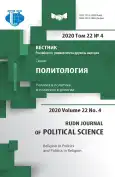The Politicization of Society and the Religious Issues in Modern Russia
- Autores: Pinkevich V.K.1
-
Afiliações:
- The Russian Presidential Academy of National Economy and Public Administration
- Edição: Volume 22, Nº 4 (2020): RELIGION IN POLITICS AND POLITICS IN RELIGION
- Páginas: 647-663
- Seção: RELIGION AND POLITICS IN RUSSIA: TOPICS AND CONTROVERSIES
- URL: https://journal-vniispk.ru/2313-1438/article/view/322188
- DOI: https://doi.org/10.22363/2313-1438-2020-22-4-647-663
- ID: 322188
Citar
Texto integral
Resumo
The purpose of the article is to trace the connection between the change in the religious policy of the state and the anti-clerical protests of the 2016-2020s. Statements against Church restitution and the construction of churches have caused extensive discussion, which has given rise to a number of contradictory, sometimes mutually exclusive interpretations. According to the author, the reason for these protests was not private reasons, but deeper reasons related to the religious policy of the state. The author pays special attention to changes in religious legislation, which led to increased control over the private life of citizens and infringement of the right to freedom of ideological choice. The article points out that the religious issue has divided Russian society: the ruling class on the one hand, and a significant part of citizens on the other, have become increasingly different in understanding the place and role of religion in the life of the country. According to the author, the protests in Yekaterinburg, St. Petersburg, and Moscow were special cases of numerous manifestations of politicization of society and growing dissatisfaction with the state of state-confessional relations in modern Russia. The author concludes that the degree of conflict, the high level of solidarity actions, a diverse and resonant series of events, as well as the level of ideological discussion allow us to classify these events as political and plebiscite.
Sobre autores
Vasily Pinkevich
The Russian Presidential Academy of National Economy and Public Administration
Autor responsável pela correspondência
Email: titla@yandex.ru
Doctor of Historical Sciences, Professor, Professor of the Department of State-Confessional Relations
b.1, 82, Prospekt Vernadskogo, Moscow, 119571, Russian FederationBibliografia
- Sitnikov M.N. Religion and metamorphoses of confessional ideology. In: Secularism, secularity and religion: historical, legal, and philosophical aspects. E.S. Elbakyan (ed.). Bishkek; 2020. p. 56–61 (In Russ.).
- Morozov O. The Legends and Myths of Russian History: the Russian Orthodox Church’s Approach to History at the Start of the Twenty-First Century. In: Constructing and Deconstructing the Secular World. Filatov S., Malashenko A. (eds.). Moscow: Russian political encyclopedia (ROSSPEN); Moscow Carnegie Center; 2014 (In Russ.).
- Filatov S.B. Traditional religions, “Russian civilization” and sovereign democracy. In: Religion and globalization in the expanses of Eurasia. Filatov S., Malashenko A. (eds.). Moscow: Russian political encyclopedia (ROSSPEN); Moscow Carnegie Center; 2009. p. 8–41 (In Russ.).
- Knorre B.K. Russian Orthodoxy. Post-Secular Institutionalization in the Realm of Power, Politics, and the Law. In: Constructing and Deconstructing the Secular World. Filatov S., Malashenko A. (eds.). Moscow: Russian political encyclopedia (ROSSPEN); Moscow Carnegie Center; 2014 (In Russ.).
- Alperovich V., Kravchenko M., Sibireva O., Judina N. Xenophobia, freedom of conscience and anti-extremism in Russia in 2018: Collection of annual reports оf the information and analytical center “Sova”. Verhovsky A. (ed.). Moscow: Sova center; 2019 (In Russ.).
- Ryakhovsky V.V. Actual problems of the implementation of freedom of conscience. In: Secularism, secularity and religion: historical, legal, and philosophical aspects. E.S. Elbakyan (ed.). Bishkek; 2020. p. 127–136.
- Ponkin I.V. Legal basis of secularism of the state and education. Moscow, Pro-Press; 2003. P. 33 (In Russ.).
- Pchelintsev A.V. Secularism of the state as a constitutional and legal guarantee of religious freedom. In: Pchelintsev A.V., Zagrebina I.V., Lunkin R.N. Freedom of conscience in modern Russia. Moscow: Regional public organization for promoting citizen education. Information and analytical center “Sova”; 2017. p. 71–88 (In Russ.).
- Melnikov A.L. Vladimir Putin: the pious leader of a secular state. In: Secularism, secularity and religion: historical, legal, and philosophical aspects. E.S. Elbakyan (ed.). Bishkek; 2020. p. 61–68 (In Russ.).
- Lunkin R.N. Православные консерваторы и общество: movement “Sorok sorokov”. In: Pchelintsev A.V., Zagrebina I.V., Lunkin R.N. Freedom of conscience in modern Russia. Moscow: Regional public organization for promoting citizen education. Information and analytical center “Sova”; 2017. p. 5–22 (In Russ.).
Arquivos suplementares









